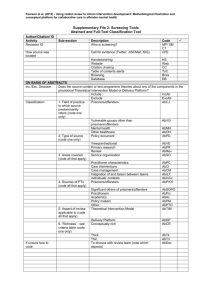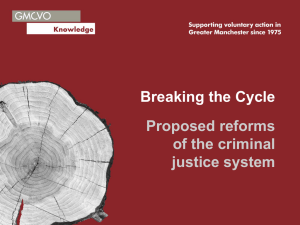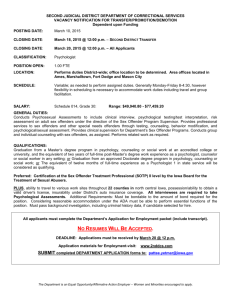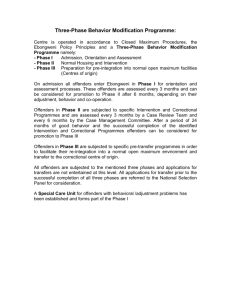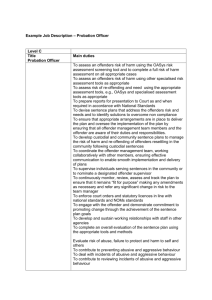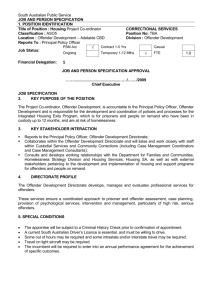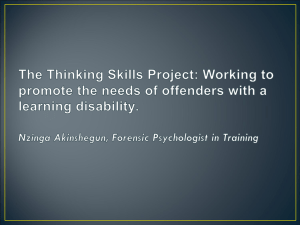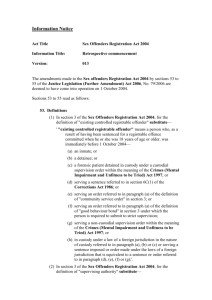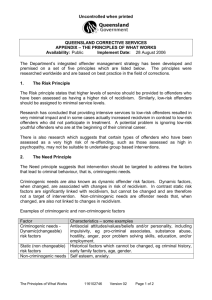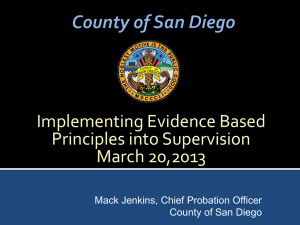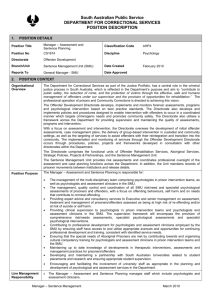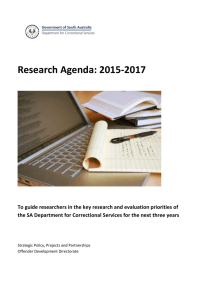POSITION DESCRIPTION - Department for Correctional Services
advertisement
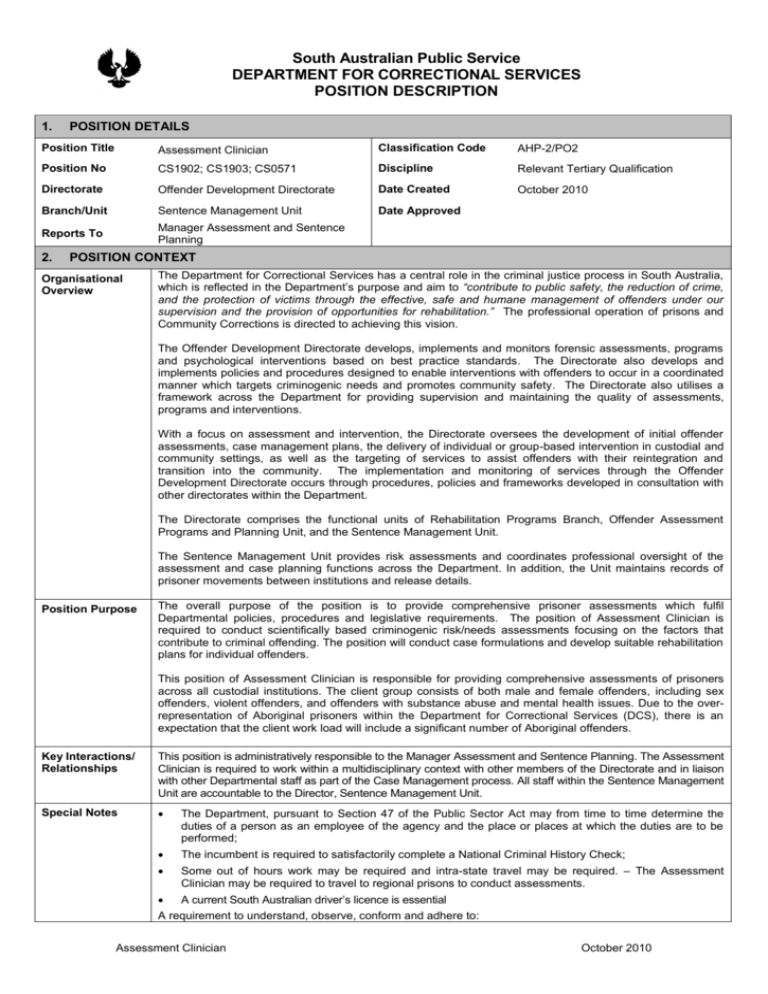
South Australian Public Service DEPARTMENT FOR CORRECTIONAL SERVICES POSITION DESCRIPTION 1. POSITION DETAILS Position Title Assessment Clinician Classification Code AHP-2/PO2 Position No CS1902; CS1903; CS0571 Discipline Relevant Tertiary Qualification Directorate Offender Development Directorate Date Created October 2010 Branch/Unit Sentence Management Unit Date Approved Reports To Manager Assessment and Sentence Planning 2. POSITION CONTEXT Organisational Overview The Department for Correctional Services has a central role in the criminal justice process in South Australia, which is reflected in the Department’s purpose and aim to “contribute to public safety, the reduction of crime, and the protection of victims through the effective, safe and humane management of offenders under our supervision and the provision of opportunities for rehabilitation.” The professional operation of prisons and Community Corrections is directed to achieving this vision. The Offender Development Directorate develops, implements and monitors forensic assessments, programs and psychological interventions based on best practice standards. The Directorate also develops and implements policies and procedures designed to enable interventions with offenders to occur in a coordinated manner which targets criminogenic needs and promotes community safety. The Directorate also utilises a framework across the Department for providing supervision and maintaining the quality of assessments, programs and interventions. With a focus on assessment and intervention, the Directorate oversees the development of initial offender assessments, case management plans, the delivery of individual or group-based intervention in custodial and community settings, as well as the targeting of services to assist offenders with their reintegration and transition into the community. The implementation and monitoring of services through the Offender Development Directorate occurs through procedures, policies and frameworks developed in consultation with other directorates within the Department. The Directorate comprises the functional units of Rehabilitation Programs Branch, Offender Assessment Programs and Planning Unit, and the Sentence Management Unit. The Sentence Management Unit provides risk assessments and coordinates professional oversight of the assessment and case planning functions across the Department. In addition, the Unit maintains records of prisoner movements between institutions and release details. Position Purpose The overall purpose of the position is to provide comprehensive prisoner assessments which fulfil Departmental policies, procedures and legislative requirements. The position of Assessment Clinician is required to conduct scientifically based criminogenic risk/needs assessments focusing on the factors that contribute to criminal offending. The position will conduct case formulations and develop suitable rehabilitation plans for individual offenders. This position of Assessment Clinician is responsible for providing comprehensive assessments of prisoners across all custodial institutions. The client group consists of both male and female offenders, including sex offenders, violent offenders, and offenders with substance abuse and mental health issues. Due to the overrepresentation of Aboriginal prisoners within the Department for Correctional Services (DCS), there is an expectation that the client work load will include a significant number of Aboriginal offenders. Key Interactions/ Relationships This position is administratively responsible to the Manager Assessment and Sentence Planning. The Assessment Clinician is required to work within a multidisciplinary context with other members of the Directorate and in liaison with other Departmental staff as part of the Case Management process. All staff within the Sentence Management Unit are accountable to the Director, Sentence Management Unit. Special Notes The Department, pursuant to Section 47 of the Public Sector Act may from time to time determine the duties of a person as an employee of the agency and the place or places at which the duties are to be performed; The incumbent is required to satisfactorily complete a National Criminal History Check; Some out of hours work may be required and intra-state travel may be required. – The Assessment Clinician may be required to travel to regional prisons to conduct assessments. A current South Australian driver’s licence is essential A requirement to understand, observe, conform and adhere to: Assessment Clinician October 2010 3. Legislative requirements that apply to the role. This includes but is not limited to the Public Sector Act; Correctional Services Act, Work Health & Safety Act, Equal Employment Opportunity Act, the Workers Rehabilitation & Compensation Act and various relevant industrial awards and enterprise agreements. General public sector principles/practices including the SA Public Sector Code of Ethics and DCS Human Resource policies/guidelines including personnel management standards, employee conduct standards and DCS Employee Code of Conduct and DCS values system. Work health and safety and injury management requirements as set out in Departmental policies and procedures, including complying with any reasonable instruction associated with these documents. PRIMARY OUTCOMES AND ACCOUNTABILITIES KEY RESULT AREA KEY INDICATORS Conducting professional and comprehensive prisoner interviews in the custodial environment; Conducting comprehensive assessments for the purpose of evaluating risk, identifying criminogenic needs and guiding clinical formulation and treatment delivery to prisoners/offenders; Preparing comprehensive written reports that inform the management and treatment of prisoners/offenders; Providing realistic and evidence-based recommendations for prisoners/offenders that are consistent with a risk-based approach to offender rehabilitation. Developing tailored and targeted treatment plans for individual prisoners that provide both custodial and community based recommendations. Conducting criminogenic risk and need assessments of prisoners as part of the Case Management process; Providing an expert resource to Case Management staff, including participating in the development of Individual Development Plans and contributing to the Serious Offender Committee; Assisting the Directorate in the ongoing review, development and evaluation of assessment tools and processes. Ensuring that the special needs of Aboriginal prisoners/offenders are met by employing a model of cultural competency within assessments and treatment plans Maintaining awareness and up to date knowledge of developments in the literature regarding risk assessment and therapeutic interventions for prisoners/offenders of best practice within an offender population; Identifying needs and assisting in the training and development of Departmental staff. Professional Development Undertake ongoing developmental opportunities for individual professional development and growth. Administration Maintaining and developing client records and recording all contact with prisoners Maintaining quality documentation of risk assessments and decision making processes. Offender Assessment Prisoner/Offender Management Program Development 4. PERSON CAPABILITY PROFILE OPERATIONAL CAPABILITIES Essential Qualifications Relating and Communicating Achieving Objectives Personal Drive and Professionalism For AHP2: A degree level qualification in either social work or psychology giving eligibility to membership with the relevant professional association. For PO2: Appropriate tertiary qualifications in community services, sociology, criminology, justice, correctional practice, social sciences, human services, health or related field Proven experience in the area of offender assessment and report writing. A Driver’s license is essential. Some out of hours travel may be required for which time off in lieu can be negotiated. Demonstrated ability to conduct professional and comprehensive assessment interviews. Demonstrated ability to work with a culturally and socially diverse group of prisoners, and to apply a culturally responsive framework to guide assessment and treatment planning. Proven experience in communicating clearly, both verbally and in writing. Demonstrated ability to produce quality reports in an efficient and professional manner. Demonstrated ability to undertake comprehensive criminogenic needs assessments, including criminogenic case formulation, risk assessment, needs assessment and treatment planning. Demonstrated ability to apply a high level of clinical judgement to determine risk factors and treatment priorities. Demonstrated ability to work with a minimum of direction and to effectively communicate with and work collaboratively as part of a multi-disciplinary team. Assessment Clinician October 2010 Continuous Improvement Knowledge and understanding of Departmental Core Values (Code of Ethics) and the Employee Conduct Policy. Knowledge and understanding of the Risk/Needs Model of Offender Rehabilitation as it applies to prisoner assessment and treatment planning. JOB SPECIFIC CAPABILITIES 1. Respect Cultural Diversity – by taking actions and providing services that are inclusive of Aboriginal people and other offenders from culturally and linguistically diverse back grounds as well as engaging in learning about other cultures to better establish relationships and improve services. 2. Assessing and Minimising Client Risk – understand and evaluate the factors that contribute to offender/family/community risk and develop action plans to reduce or eliminate the risks. 3. Coaching and Developing Others – provide advice, support to mentoring and disseminate agency knowledge and experience across the team. 4. Logical Thinking – examine current methodologies and trends within the work environment and develop solutions that are easy to implement. 5. Professionalism – continuously develop professional knowledge base, promote profession across DCS and display ethical behaviour consistent with industry/standards guidelines. 5. ACKNOWLEDGEMENT Chief Executive/ Delegate Assessment Clinician Signature Date October 2010
